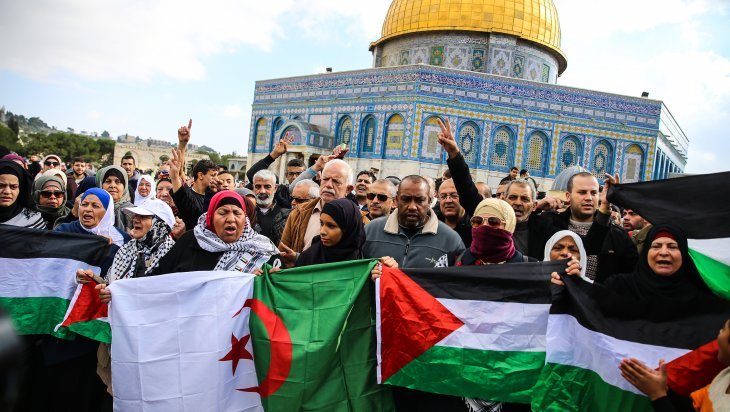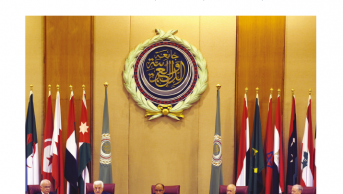Algeria's Stance on the Palestinian Issue

The Palestinian issue has been a topic to which Algerian people and its government have always paid close attention and have always taken a principled stance on the side of the Palestinians against the Israeli occupation. While some Arab states have recently signed normalization agreements with Israel, Algeria has strongly opposed normalization with Israel and regards the recognition of Israel as a betrayal to the Arabs and the Islamic world. Algeria's stance towards the Palestinian issue differs not only in terms of government or state policies, but also in terms of Algerian people’s more sensitive attitude compared to other Arab countries. In the surveys on reactions of Algerians to normalization agreements with Israel, it is seen that Algeria is one of the Arab countries that oppose normalization with a rate of 99% and react strongly against the tensions with Israel.[1] Indeed, the fact that Algeria does not recognize Israel and unconditionally supports the Palestinians is a result of the memory of Algerian society, who faced the French occupation and colonization and endured a bloody struggle for independence.
In Algeria, where the majority of people are Muslim and Arab, the state is built on an Islamic and Arab identity. Accordingly, anti-colonialism was accepted as one of the basic principles of the state's foreign policy. Algerians tried to support the Palestinian struggle for independence so that the painful experiences they had gone through during 130 years of French colonialism would not be experienced by other nations. For instance, from an Algerian point of view, one dimension of the Western Sahara conflict is that Morocco extorts the demands of the people in the region, namely the right to govern themselves, through the occupation of Western Sahara. Likewise, Algeria approaches the Israeli occupation in Palestine as the persecution of their Palestinian brothers of the same religion and ancestry. Hence, Algeria has never established any diplomatic relations with Israel, as it has always approached the Palestinian issue with the bitter memories of colonial period under occupation.
From a historical point of view, Algeria has always been at the forefront in advocating the Palestinian cause. Algeria supported its Arab allies against Israel by sending troops and aircrafts to the Six-Day War (1967), which started only five years after Algeria’s independence. Algeria also acted in line with other Arab states in the 1973 Yom Kippur War, although the war was in a relatively remote geography, and provided again troop and aircraft support. In the period when the Arab-Israeli wars ended and diplomatic relations were tried to be established and Egypt signed the Camp David Agreement with Israel under Anwar Sadat’s leadership, Algeria reacted strongly by cutting off its relations with Egypt.
Establishing close relations with the Palestine Liberation Organization (PLO) led by Yasser Arafat, Algeria provided weapons and training support to Palestinian militants throughout the 1970s. However, the most crucial development that put Algeria to an exceptional position in the Palestine issue was undoubtedly the former’s help to the PLO in obtaining observer status in the UN in 1974 and to Yasser Arafat in speaking before the UN General Assembly, as well as allowing Palestine to open an embassy in Algeria. As a result of the diplomatic initiatives of the Representative of Algeria to the UN, Abdelaziz Bouteflika, who was the Chairman of the General Assembly in the UN, the PLO was granted observer status in the UN and Yasser Arafat addressed the representatives of all states, which ultimately led to the recognition of the Palestinian state with the 1993 Oslo Accords and to the two-state solution to the Israeli–Palestinian conflict in the international realm.
With the start of the First Intifada against the Israeli occupation in 1987, Algeria was at the forefront in mobilizing the Arab League and in making the Palestinians' voices heard. The fact that the Palestinian state declared its independence in Algiers on November 15, 1988, under the leadership of Yasser Arafat and the first state to recognize Palestine was Algeria is an indication of this very phenomenon. Strongly opposing the diplomatic relations with Israel of some Arab states such as Jordan and Morocco, which gained impetus following the Oslo Peace Talks in the 1990s, Algeria continued to maintain its principled and tough stance. However, because of the civil war starting in 1991, Algeria distanced itself from regional developments and, accordingly, from the Palestinian issue.
In a nutshell, when we look at the short history of Algeria after its independence, the association of painful memories of colonization and occupation with the persecution of Palestinians has put Algeria to a position where there is no room for concessions to Israel regarding the Palestinian issue. As we have pointed out before, this situation does not emerge as a policy of the Algerian state or government; on the contrary, it is a situation in which the Algerian people identify themselves with the Palestinians and embrace the Palestinian cause with an emotional bond. This is of course one of those issues that affect and shape domestic politics. For example, the Algerian President Abdelaziz Bouteflika’s handshake and quick conversation with Israeli Prime Minister Ehud Barak during the funeral of Morocco’s king Hasan II caused indignation in the Algerian public. In the following process, Abdelaziz Bouteflika had to make statements to the media frequently in order to convince the Algerian public that Algeria did not recognize Israel and did not hold secret talks.
Before the Trump administration initiated the normalization process of the Arab states with Israel, and the solution plan they called the "Deal of the Century" became official, Algerian officials expressed their firm opposition to the normalization and said that they would not recognize the existence of a state called Israel. President Tebboune emphasized Algeria’s deep commitment to the Palestinian issue, stating that Algeria regards the Palestinian issue as a "sacred" cause. Formerly opposing Egypt and Jordan’s normalization of relations with Israel, Algeria maintained its consistent stance by harshly criticizing the UAE, Bahrain, Morocco, and Sudan as they joined the normalization trend with the mediation of the Trump administration. Algeria's reaction against the normalization agreements was far from being limited to rhetoric. Taking actions in the face of the developments, Algeria withdrew from the OECD International Parliaments Network meeting in response to the participation of an Israeli representative after the normalization agreements and did not allow the aircraft of the Israeli delegation to pass through its airspace, which was on its way to start the diplomatic negotiations with Morocco,.
Algeria continued its solidarity with the Palestinians by showing its clear stance in face of the recent developments that started with the forced displacement of Palestinians from the Sheikh Jarrah Quarter and the subsequent attacks on Muslims in the Al-Aqsa Mosque. Meanwhile, President Erdogan had a telephone conversation with Algerian President Abdelmadjid Tebboune and the parties decided to continue their strengthened cooperation on the Palestinian issue as well. Likewise, Algerian Foreign Minister Sabri Boukadoum thanked Turkey for its cooperation and efforts regarding the Palestine issue and expressed that Algeria would remain in solidarity with Palestine.
As a result, despite its relatively remote geography, Algeria, as one of the important countries in North Africa, is closely concerned about the Palestinian issue as a state and society, and continues to support Palestinians at least by opposing Israel's occupying policy, albeit with limited means. Algeria's principled and consistent stance is appreciated by the Palestinians at a time when many Arab states have strengthened Israel’s legitimacy by normalizing relations with the latter, or even worse, having publicly supported Israel. Supporting Turkey's diplomatic initiative efforts after Israel's recent attacks, Algeria can contribute to its historical role in the Palestinian issue in the near future by providing material and moral support to the Arabs living in Palestine and Israel, and also by acting as a mediator in disputes between the Palestinian parties. Besides, Algeria has the capacity to prevent Israel's occupying policy by getting engaged in coordination with important actors, such as Turkey and Egypt, and resensitize the Arab world towards the Palestinian cause. The principled and sincere stance of Algeria towards the Palestinian issue since its independence may offer new historical opportunities to Algeria and provide significant gains to the Palestinians against Israel, especially in terms of ensuring the unity of the Palestinian parties.
[1] “Arab majorities overwhelmingly oppose any normalisation with Israel”, TRT World, 7 Ekim 2020.







